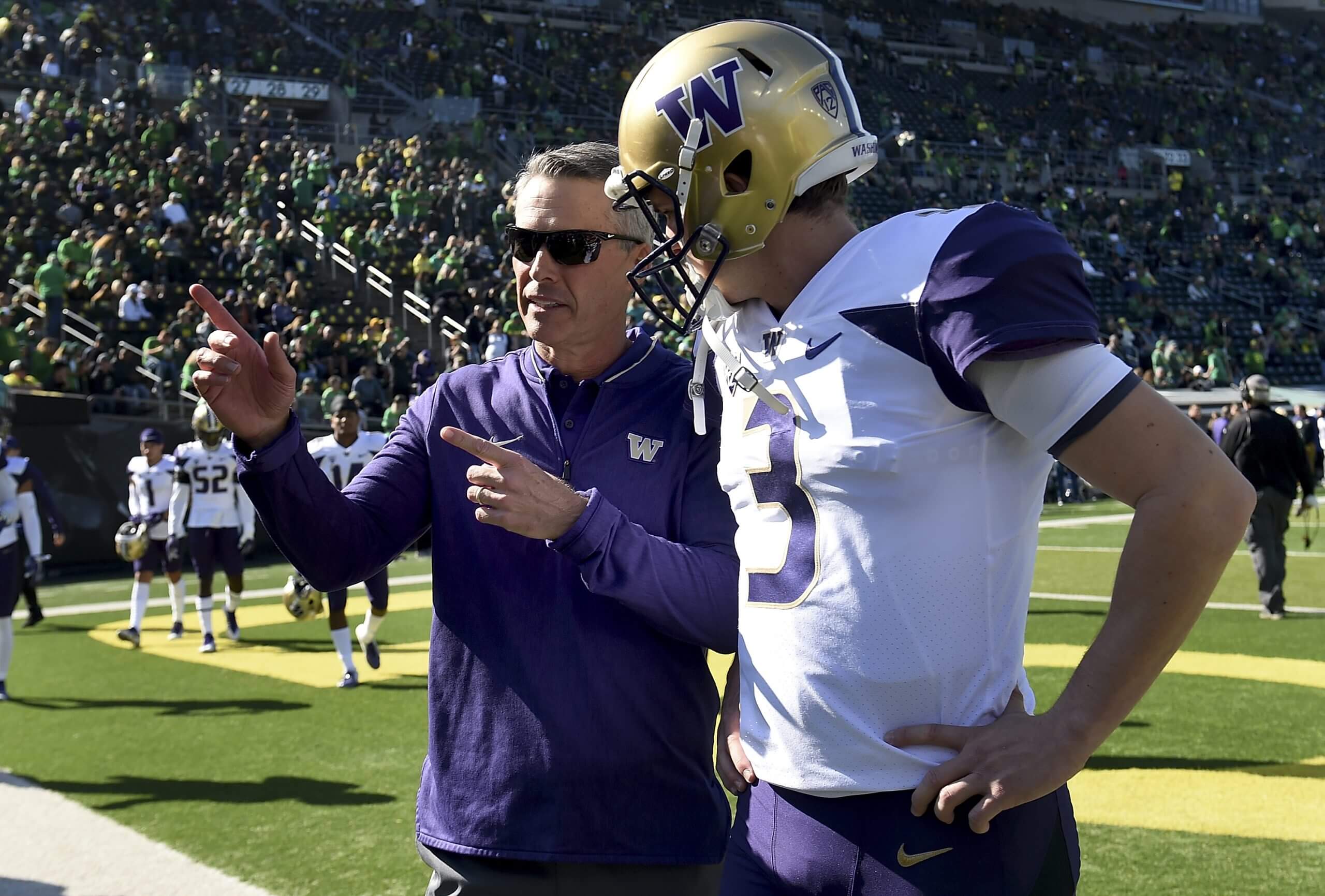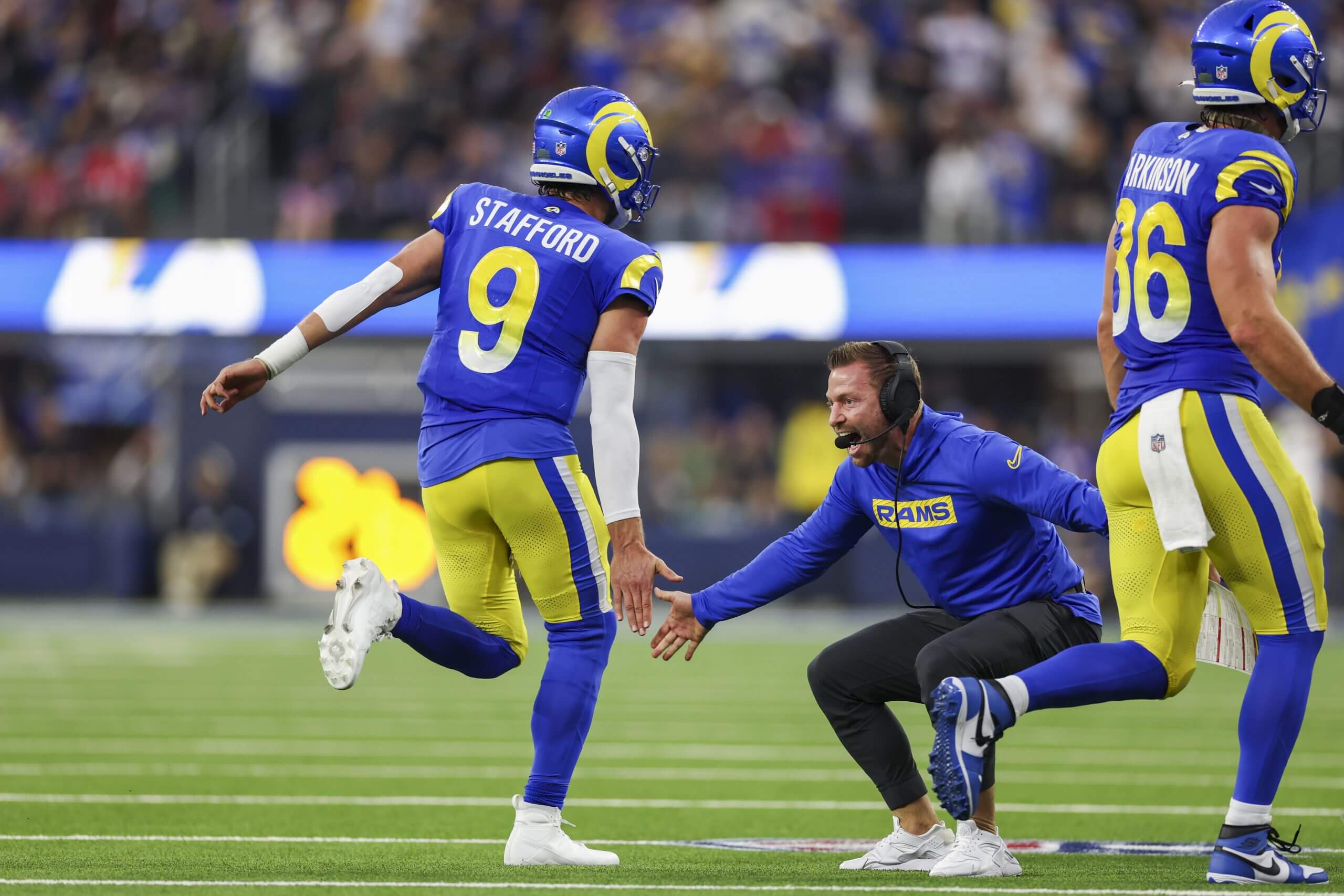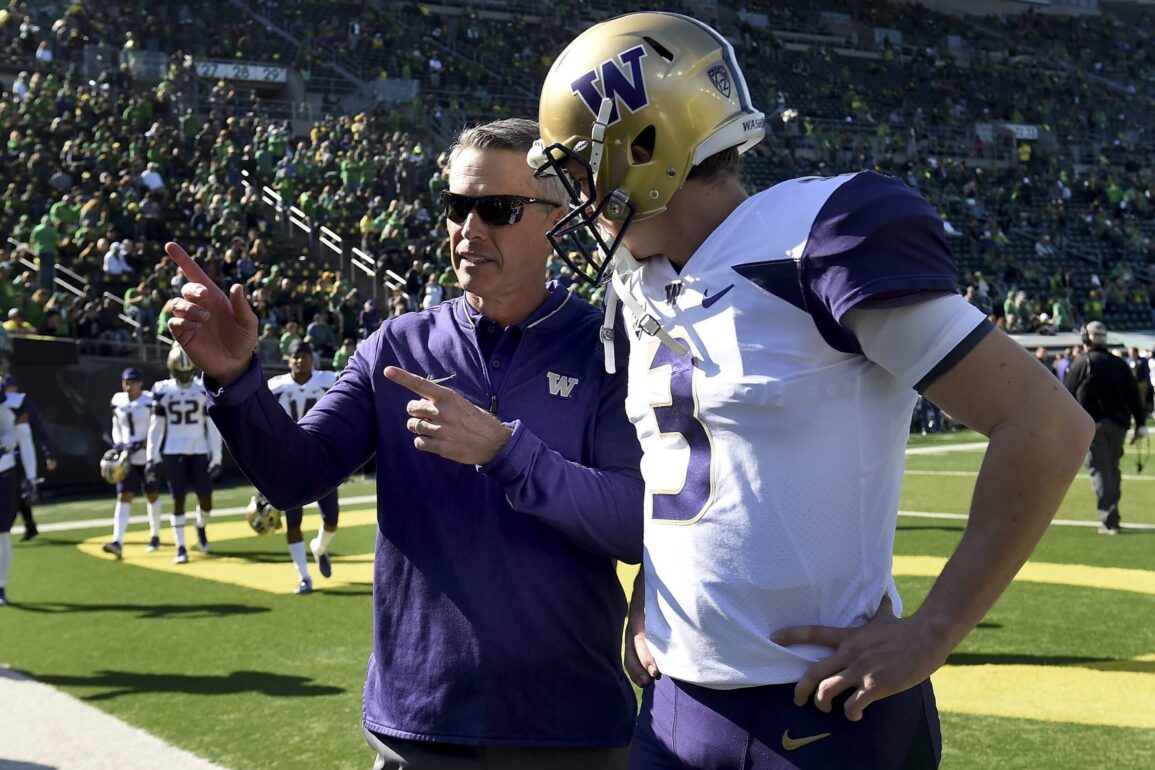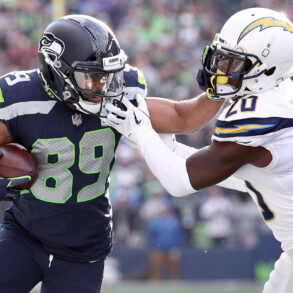Sean McVay still has the voicemail from two years ago. He hasn’t listened to it since, but plays it now as he lays his iPhone flat on the desk beside him.
“Sean, this is Chris Petersen calling. I am the former head coach at Boise State and the University of Washington … “
Petersen’s voice is warm and earnest.
“I’ve just been thinkin’ about ya. I know you’re going through some hard times … “
Advertisement
As he listens, McVay is the picture of control, from his hair slicked into its signature shark fin to his matching athleisure set and spotless sneakers. But then his eyes fill with tears, and he doesn’t swipe them away.
Petersen called McVay in January 2023 after seeing clips of him following the Los Angeles Rams’ disastrous 2022 season, when McVay admitted he was contemplating leaving coaching just one year after becoming the NFL’s youngest Super Bowl-winning head coach. When Petersen saw McVay’s hollow-eyed expression and heard his hoarse voice, he knew there was more at work than a dismal season record and professional fatigue. “Oh my stars, I know this guy,” Petersen said to himself. “I know this story.”
So he picked up his phone.
That voicemail was an outstretched hand to a broken man. Petersen, who in 2019 suddenly stepped away from his career as one of the most successful coaches in college football history, has become a mentor, confidant, friend and adviser to McVay as the young coach worked his way out of what he calls the hardest year of his life.
“You’re in the middle of a storm. It’s real gray; things are cloudy,” McVay said. “He saw that press conference. I was crying out for help, I just didn’t realize I was.”
More than two years after their first conversation, McVay, 39, credits Petersen’s support as a significant part of his long-term recommitment to coaching.
“He has helped me see this game and this profession in (such) a totally different lens that the idea of not coaching feels so laughable,” said McVay. “I get so much more joy out of things that I just didn’t give a s— about before.”
The head coach of Boise State from 2006-13 and Washington from 2014-19, the 60-year-old Petersen is a college football legend. His teams were energetic, creative and daring — the stuff of sports fairy tales.
Petersen helped Boise State take down touchdown-plus favorite Oklahoma in the 2007 Fiesta Bowl as a first-year head coach, earning national fascination for his audacious use of trick plays in key situations that he called into the headset with an icy stare. The Broncos went undefeated that year, and from 2008-11 became the first FBS team to reach 50 wins over four years. The first two-time winner of the Paul “Bear” Bryant Coach of the Year award, Petersen became well-known in coaching circles for the quality of the culture built for his staff and players.
Advertisement
When Jimmy Lake arrived to coach defensive backs in 2012, he said he “wanted to know what the whole ‘Boise State mystique’ was all about.” It took him about a month.
Petersen’s staff meetings often wouldn’t cover football at all. Instead, “it was all about life and life lessons,” Lake said. “It would really pour into our staff and it helped me become a better father, a better husband, a better friend. The way that it was presented, it was really all-encompassing of life. Of course, you could also then use those examples to help you in coaching your players.”
To Lake, the energy at Petersen’s program felt very different than his previous five years as an NFL assistant. The staff spent time together instead of shut away in their respective offices. People said “good morning” to each other.
During summer practices, Petersen held drills and games where groups of players from different positions teamed up to compete. Lake noticed deep into the season that players outside of their respective position groups hung out with each other. He realized that everything Petersen built into their daily routine included some method of bringing them all closer.
“Anywhere else I’d been, we’re locked in our meeting rooms, and we’re trying to get the X’s and O’s right, we’re trying to get the technique and fundamentals of football right,” Lake said. “First and foremost for Chris Petersen, it was making sure the culture and the connections were right. That said a lot. Then all the X’s and O’s fell into place.
“That’s where you could feel it — the vibe and the energy in being around people (was) what the difference was.”

Petersen and quarterback Jake Browning helped revive Washington, leading the Huskies to 39 wins from 2015-18. (Steve Dykes / Getty Images)
To those inside the program, it felt like Petersen’s methods would last, like maybe they had found a new model for building a team and a culture. But looking back, all the warnings of an incoming crash are now clear to Petersen. They just hid under his success.
Petersen went 92-12 in eight seasons in Boise but said he started to feel himself “sliding backwards.” “I wasn’t as good of a coach, wasn’t as good of a leader, probably wasn’t as good of a person as I could be,” he said. “I felt myself becoming cynical, frustrated, short.”
Advertisement
Peterson’s wife, Barbara, suggested counseling, maybe even a new occupation. He was skeptical that any person outside of his world could make sense of the stresses that came with it. He tried to ignore how he felt. Then, in 2014, Washington offered Petersen its vacant head coaching job. Petersen had turned down chances at bigger-name programs for years — he twice interviewed at USC but withdrew his candidacy each time. Now he was ready to make a move.
“I laugh when I say this to you now, but I’m thinking, Well, maybe I just need a new set of problems,” he said. “There were some really appealing things about Washington, don’t get me wrong. But what I was going through, I’m thinking, OK, maybe if I throw away my problems and take on a new set of problems, that will solve my problem.”
Petersen threw himself into overhauling the Huskies program with so much energy that he now calls the process “numbing.” Then came the winning. After his first season at Washington, he became the fastest FBS coach to reach 100 wins, which he did in just 117 games. In his third season, Washington won 12 games before losing to Alabama in the College Football Playoff and finishing the year ranked No. 4.
But winning couldn’t stave off the old feelings. Despite consecutive 10-win seasons in 2017 and 2018, Petersen started sliding again and believed he was dragging his team down. He loved his job, loved his staff and his players, but he didn’t understand himself.
On Dec. 2 2019, he resigned. Lake, then Petersen’s defensive coordinator and soon to be his successor as Washington’s head coach, said the decision came as a total shock. He was that good at hiding his struggle.
Petersen wanted to visit other programs to see if they had some secret to handling pressure and managing the job he hadn’t yet found. But a few months into his break, the COVID-19 pandemic shut down travel and in-person contact, and Petersen was forced to spend a lot of time alone with himself and his thoughts.
“Had (I been) able to travel, I would have been going and chasing all of the wrong answers,” he said. He knew he would have gravitated toward schematic or structural developments, “and not really thinking about, how do I get better?”
Advertisement
Petersen began to study his own psychology and the uniquely competitive and public space that football coaches occupy, which he calls “the arena.”
“The arena can squeeze you and narrow you so quickly to certainly a lesser version — or the worst version — of yourself extremely easily,” he said. “You have to have a plan. You have to be almost counter-culture. Like, you have to work against everything society is telling you and rewarding you for.”
Two years into Petersen’s learnings, he saw McVay on television and reached for his phone.
Each offseason during his first six years as the head coach of the Rams, McVay became briefly aware he wasn’t feeling right. “I couldn’t pinpoint what it was,” he said. “Imbalances or just … I knew I was running a race that wasn’t sustainable.”
He usually pushed the feeling away. He didn’t have time for much else in his pursuit of a championship. Was he tired? He’d disappear for just a few days and rest before returning to work at his typical obsessive pace. Mentally blocked? There were leadership books to read or new ideas to glean from the constant churn of young assistants working under him.
When the Rams appointed him the youngest head coach in NFL history in 2017, McVay’s leadership and communication abilities — not to mention his understanding of the game’s strategic evolution — led the organization to build its entire football operation around the then-30-year-old.
It paid off. The Rams won a lot, and quickly. Empowered by the organization and motivated to win a championship, McVay could discard anyone who couldn’t match his pace. Those moves were for the greater good, he reasoned; everything he did was to win a Super Bowl.
At times, McVay’s rush to contend conflicted with his humanity. Throughout the 2020 season, rising tension between McVay and quarterback Jared Goff led to a total break in communication. McVay then urged the Rams front office to trade away Goff in the deal for veteran Matthew Stafford in early 2021. McVay has since expressed his regret over how he handled the personal elements of that trade. Back then, losing relationships wasn’t a real consequence to him – losing football games was.
Advertisement
“When I look back on especially the first five years of my tenure here, there was a lot of selfishness, where I knew how to say the right things but I didn’t feel it,” he said.
Conversely, McVay said he badly wanted to win for his team captains and his coordinators during the Rams’ Super Bowl run following the 2021 season, which led to a kind of “purity.” But after he hoisted the Lombardi Trophy, that feeling quickly left him.
“After you win, it becomes more about you than you’d ever like to admit,” he said. “That’s when you’re like, ‘man, this is it, huh?’”
The team imploded during the 2022 season. Burnout following the championship run made it all worse. McVay was outwardly frustrated and privately angry when assistants relied on him for answers, even though he was the one who created an order of operations that flowed wholly through him.
He saw his struggling, tired team as a reflection of himself, so he withdrew. He said all the right things in team meetings but closed his office door afterward. He even gave up play calling for a short time. He considered giving up coaching altogether, which he acknowledged in a news conference with local reporters on a rainy, gray afternoon as the Rams’ 2022 season ended.
Petersen saw footage of McVay’s comments and got his number from Kellen Moore, Petersen’s former quarterback at Boise State and the current head coach of the New Orleans Saints. Petersen assumed he wouldn’t hear back from McVay and said as much in his voicemail, adding that if he could help, he would.
“I was in my office at home,” McVay said. “I’ve been a fan of his, and he was like, ‘You probably don’t know who I am,’ which shows you his humility. I’m like, ‘Yeah right.’ I’ve been watching him for a long time, I knew exactly who he was.”
Their first conversation lasted two hours.
Advertisement
After McVay’s initial crash, he had worried about oversharing with family or friends. His problems were unique and privileged. At times, he felt guilty for even categorizing them as problems. But he was surprised at how easily he could unload to Petersen. The two men had common ground. They were from the same world. They both were deeply unhappy at the top of their respective careers and in relentless pursuit of what they believed was greatness.
“As a result of that chase, there were some good times, but there were a lot of times that I became somebody that I don’t like,” said McVay, “I think he would probably say the same thing.”
Typical of football coaches, Petersen and McVay quickly fell into a routine of regular correspondence as the 2023 season began. McVay and his wife, Veronika, became parents that October. Petersen, who has two sons, often pressed McVay with questions or challenges that led to thoughtful conversations about how he was managing his time at home. Setting an example of perseverance for his son, Jordan, was a big factor in McVay’s decision to stay in coaching, but could he be more present with his family, even in the middle of a season?
Injuries and compounding losses made a 1-4 start to the 2024 season feel eerily similar to 2022. McVay admitted he still got just as angry and at times felt just as out of control. But this time, he kept his office door open. He held frequent one-on-one meetings with players and staff to reinforce their good habits and correct their bad ones. He took feedback from assistants, even his younger players. He delegated instead of taking every problem on himself.
Daily, McVay repeated three things Petersen once said to him: Stay present. Stay grateful. Keep doing hard things. His team started to show a new kind of resilience that inspired him. Petersen believes it was also a reflection of McVay’s internal progress.
The Rams won nine of their next 12 games and became NFC West champions. In January, despite mass evacuations and a relocated wild-card game due to wildfires across Los Angeles, McVay’s team stuck together, trouncing the Minnesota Vikings 27-9. In the swirling snow of the divisional round in Philadelphia, the Rams came just two plays short of beating the eventual Super Bowl-champion Eagles.
As he stood in front of his players in the visitors’ locker room moments after the loss, McVay said he was staggered at the hurt that flooded through him — not for himself, he realized, but for them. It was, he said, the first season he felt like an actual head coach.
Advertisement
“I did not like being 1-4. But you know what I know about people? They can handle it,” McVay said. “I know our coaching staff can handle it. … A few years ago, we wouldn’t have been able to do the things we were able to do in terms of my role and responsibility as a leader. That’s the truth. There’s no f—ing way. I would have melted.”

McVay’s 2024 Rams pulled together and turned their season around following a 1-4 start. (Katelyn Mulcahy / Getty Images)
Lake joined the Rams as assistant head coach in 2023 following a short tenure at Washington. After spending the 2024 season as the defensive coordinator of the Atlanta Falcons, Lake returned to L.A. to work for McVay. He can see Petersen’s influence.
“He’s also extremely into pouring into people and getting the best out of them, and genuinely, authentically wants people to succeed around him,” Lake said. “That is very much like Chris Petersen.”
McVay still calls himself a “basket case,” but usually he says it with a laugh. He is still driven by competition and even perfectionism, still feels the same anger and misery he always has when he loses or comes across a problem he can’t immediately solve.
“I still am who I am,” he said, “But these are skills you develop. … You’re building skills and you’re building opportunities to be resilient by acknowledging whatever those shortcomings are.”
Influenced in part by Petersen, McVay said he will change the messaging and signage around the Rams’ practice facilities this offseason. For years, his slogan and the starting point for his team culture has been “We not me.” Now, it will say “We then me.”
The initial idea was to prioritize team over self. But, as McVay learned firsthand, when subjected to unique stress without constant maintenance, the self can decay — and maybe even destroy the collective.
Now a college football analyst for Fox, Petersen quietly helps several coaches throughout all levels of the sport (and even people in other professions) in addition to McVay. In his ongoing conversations with “Coach Pete”, McVay practices reframing his worldview from quantifying every experience as a win or a loss, like he would on a football field, to something much more open-ended.
Advertisement
He reminds himself that there is no conclusion to the process of getting better, no score to keep. Petersen calls it “becoming.” For McVay, it is an idea both radical and necessary.
“(Petersen) always tells me that if he had one sign in his office if he ever got back into coaching, it would say, ‘Who am I becoming as a result of this chase?’” McVay said. “I think about that all the time.”
(Illustration: Will Tullos / The Athletic; photos: Katelyn Mulcahy, Chris Butler / Getty Images)
This post was originally published on this site be sure to check out more of their content.










